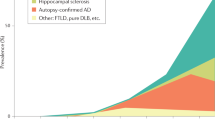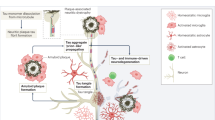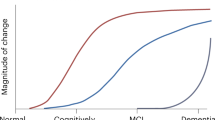Abstract
There is growing recognition that the pathophysiological process of Alzheimer disease (AD) begins many years prior to clinically obvious symptoms, and the concept of a presymptomatic or preclinical stage of AD is becoming more widely accepted. Advances in biomarker studies have enabled detection of AD pathology in vivo in clinically normal older individuals. The predictive value of these biomarkers at the individual patient level, however, remains to be elucidated. The ultimate goal of identifying individuals in the preclinical stages of AD is to facilitate early intervention to delay and perhaps even prevent emergence of the clinical syndrome. A number of challenges remain to be overcome before this concept can be validated and translated into clinical practice.
This is a preview of subscription content, access via your institution
Access options
Subscribe to this journal
Receive 12 print issues and online access
$209.00 per year
only $17.42 per issue
Buy this article
- Purchase on Springer Link
- Instant access to full article PDF
Prices may be subject to local taxes which are calculated during checkout
Similar content being viewed by others
References
Sperling, R. A. et al. Toward defining the preclinical stages of Alzheimer's disease: recommendations from the National Institute on Aging–Alzheimer's Association workgroups on diagnostic guidelines for Alzheimer's disease. Alzheimers Dement. 7, 280–292 (2011).
Bateman, R. J. et al. Clinical and biomarker changes in dominantly inherited Alzheimer's disease. N. Engl. J. Med. 367, 795–804 (2012).
Desikan, R. S. et al. Amyloid-β-associated clinical decline occurs only in the presence of elevated P-tau. Arch. Neurol. 69, 709–713 (2012).
Knopman, D. S. et al. Short-term clinical outcomes for stages of NIA–AA preclinical Alzheimer disease. Neurology 78, 1576–1582 (2012).
Jack, C. R. Jr et al. An operational approach to NIA–AA criteria for preclinical Alzheimer's disease. Ann. Neurol. 71, 765–775 (2011).
Reiman, E. M. et al. Functional brain abnormalities in young adults at genetic risk for late-onset Alzheimer's dementia. Proc. Natl Acad. Sci. USA 101, 284–289 (2004).
Quiroz, Y. T. et al. Hippocampal hyperactivation in presymptomatic familial Alzheimer's disease. Ann. Neurol. 68, 865–875 (2010).
Vlassenko, A. G. et al. Amyloid-beta plaque growth in cognitively normal adults: longitudinal [11C]-Pittsburgh compound B data. Ann. Neurol. 70, 857–861 (2011).
Holtzman, D. M. CSF biomarkers for Alzheimer's disease: current utility and potential future use. Neurobiol. Aging 32 (Suppl. 1), S4–S9 (2011).
Lee, H. G. et al. Challenging the amyloid cascade hypothesis: senile plaques and amyloid-β as protective adaptations to Alzheimer disease. Ann. NY Acad. Sci. 1019, 1–4 (2004).
O'Brien, J. L. et al. Longitudinal fMRI in elderly reveals loss of hippocampal activation with clinical decline. Neurology 74, 1969–1976 (2010).
Machulda, M. M. et al. Effect of APOE ε4 status on intrinsic network connectivity in cognitively normal elderly subjects. Arch. Neurol. 68, 1131–1136 (2011).
Landau, S. M. et al. Associations between cognitive, functional, and FDG-PET measures of decline in AD and MCI. Neurobiol. Aging 32, 1207–1218 (2011).
Petrella, J. R., Sheldon, F. C., Prince, S. E., Calhoun, V. D. & Doraiswamy, P. M. Default mode network connectivity in stable vs progressive mild cognitive impairment. Neurology 76, 511–517 (2011).
Fox, N. C. et al. Effects of Aβ immunization (AN1792) on MRI measures of cerebral volume in Alzheimer disease. Neurology 64, 1563–1572 (2005).
Kantarci, K. et al. APOE modifies the association between Aβ load and cognition in cognitively normal older adults. Neurology 78, 232–240 (2012).
Rentz, D. M. et al. Cognition, reserve, and amyloid deposition in normal aging. Ann. Neurol. 67, 353–364 (2010).
Roe, C. M. et al. Cerebrospinal fluid biomarkers, education, brain volume, and future cognition. Arch. Neurol. 68, 1145–1151 (2011).
Klunk, W. E. Amyloid imaging as a biomarker for cerebral beta-amyloidosis and risk prediction for Alzheimer dementia. Neurobiol. Aging 32 (Suppl. 1), S20–S36 (2011).
Morris, J. C. et al. Pittsburgh Compound B imaging and prediction of progression from cognitive normality to symptomatic Alzheimer disease. Arch. Neurol. 66, 1469–1475 (2009).
Rowe, C. C. et al. Amyloid imaging results from the Australian Imaging, Biomarkers and Lifestyle (AIBL) study of aging. Neurobiol. Aging 31, 1275–1283 (2010).
Sperling, R. A., Jack, C. R. Jr & Aisen, P. S. Testing the right target and right drug at the right stage. Sci. Transl. Med. 3, 111cm33 (2011).
Golde, T. E., Schneider, L. S. & Koo, E. H. Anti-Aβ therapeutics in Alzheimer's disease: the need for a paradigm shift. Neuron 69, 203–213 (2011).
Oddo, S., Billings, L., Kesslak, J. P., Cribbs, D. H. & LaFerla, F. M. Aβ immunotherapy leads to clearance of early, but not late, hyperphosphorylated tau aggregates via the proteasome. Neuron 43, 321–332 (2004).
Hyman, B. T. Amyloid-dependent and amyloid-independent stages of Alzheimer disease. Arch. Neurol. 68, 1062–1064 (2011).
Karlawish, J. Addressing the ethical, policy, and social challenges of preclinical Alzheimer disease. Neurology 77, 1487–1493 (2011).
Green, R. C. et al. Disclosure of APOE genotype for risk of Alzheimer's disease. N. Engl. J. Med. 361, 245–254 (2009).
Karlawish, J. Measuring decision-making capacity in cognitively impaired individuals. Neurosignals 16, 91–98 (2008).
Sperling, R. A. et al. Amyloid-related imaging abnormalities in amyloid-modifying therapeutic trials: recommendations from the Alzheimer's Association Research Roundtable Workgroup. Alzheimers Dement. 7, 367–385 (2011).
Osterberg, L. & Blaschke, T. Adherence to medication. N. Engl. J. Med. 353, 487–497 (2005).
Kent, D. M. & Hayward, R. A. Limitations of applying summary results of clinical trials to individual patients: the need for risk stratification. JAMA 298, 1209–1212 (2007).
The Alzheimer's Association. Changing the trajectory of Alzheimer's disease: a national imperative. The Alzheimer's Association [online], (2010).
Rosow, K. et al. Countrywide strategic plans on Alzheimer's disease: developing the framework for the international battle against Alzheimer's disease. Alzheimers Dement. 7, 615–621 (2011).
Acknowledgements
The work of R. A. Sperling and K. A. Johnson is supported in part by the National Institute on Aging (P01 AG036694; P50 AG005134; R01 AG027435; R01 AG037497), the American Health Assistance Foundation, and the Alzheimer's Association. J. Karlawish's work is supported by a Robert Wood Johnson Investigator Award in Health Policy Research. The authors thank N. Arzoumanian for her assistance with preparation of this manuscript before submission.
Author information
Authors and Affiliations
Corresponding author
Ethics declarations
Competing interests
R. A. Sperling has served as a site investigator for: Pfizer, Janssen, Avid/Lilly, and Bristol-Myers Squibb. She has served as a consultant to Roche, Janssen, Pfizer, Bayer, Satori, Biogen/IDEC, Merck, and Eisai. J. Karlawish serves on the professional advisory board for SeniorBridge and also has shares in this company. He is a co-holder of a licence on the University of Pennsylvania Integrated Neurodegenerative Disease database. K. A. Johnson has served as a site investigator and/or consultant for: General Electric Health Care, Pfizer, Janssen, Bristol-Myers Squibb, Elan, Bayer, Avid/Lilly, Siemens, and Genzyme.
Rights and permissions
About this article
Cite this article
Sperling, R., Karlawish, J. & Johnson, K. Preclinical Alzheimer disease—the challenges ahead. Nat Rev Neurol 9, 54–58 (2013). https://doi.org/10.1038/nrneurol.2012.241
Published:
Issue Date:
DOI: https://doi.org/10.1038/nrneurol.2012.241
This article is cited by
-
Centralizing prescreening data collection to inform data-driven approaches to clinical trial recruitment
Alzheimer's Research & Therapy (2023)
-
PET molecular imaging for pathophysiological visualization in Alzheimer’s disease
European Journal of Nuclear Medicine and Molecular Imaging (2023)
-
Memory markers in the continuum of the Alzheimer’s clinical syndrome
Alzheimer's Research & Therapy (2022)
-
Microbiota in neuroinflammation and synaptic dysfunction: a focus on Alzheimer’s disease
Molecular Neurodegeneration (2022)
-
Application of QPLEXTM biomarkers in cognitively normal individuals across a broad age range and diverse regions with cerebral amyloid deposition
Experimental & Molecular Medicine (2022)



